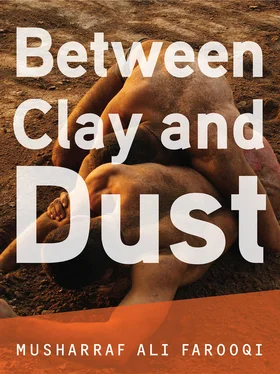“I suspect it is the builders’ doing. They may have bribed someone to ignore the new notice. Another trick to get us out of there sooner,” Banday Ali sighed as he pulled out a dead root. “There’s nobody to protest to.”
“But why didn’t Gohar Jan call on the mayor to help her in the matter. It is common knowledge that the buildings are not as decrepit as they are made out to be. Surely the mayor could have helped her. At the minimum he could have ordered an inquiry and stayed the evacuation.”
“There is no arguing with Gohar Jan,” Banday Ali said. “I can no longer even understand her. She told me she had asked the last favor of the mayor.”
Ustad Ramzi, who had not been able to solve the mystery behind the municipal help he had received, stopped in his work and looked at Banday Ali.
“At her age, too. To be without any anchor,” Banday Ali was saying. “But this is life.”
Ustad Ramzi scrutinized Banday Ali’s face again and realized he could not know about the last favor Gohar Jan had asked the mayor.
Ustad Ramzi was at a loss for words. He kept staring at Banday Ali.
“She never got any consolation from her art. Even though she remained true to it, giving up even her morning riyazat so that she could…” Banday Ali suddenly broke off.
“Gohar Jan gave up her morning riyazat?” A startled Ustad Ramzi asked. “When?”
“She had given it up years ago.”
“Years ago?” Ustad Ramzi looked at him.
“It caused her too much effort to sing twice a day,”
Banday Ali said after a brief silence. There was now a clear hint of a reproach in Banday Ali’s voice. He returned to the pruning.
Ustad Ramzi knew of Gohar Jan’s devotion to her art and the importance she attached to her morning riyazat. He wondered if what Banday Ali had implied was true.
Why did she do it? he asked himself. She could have ended her evening recitals instead.
He looked blankly at the peacocks strutting about among the rose bushes.
To hide his trembling hands, Ustad Ramzi vigorously broke the lumps of clay in the pot.
❖
Ustad Ramzi began walking up to Gohar Jan’s place every day. As he could no longer climb up, he sat at the foot of the stairwell where Banday Ali put out a chair for him.
“Ustad Ramzi is here,” Banday Ali would inform Gohar Jan when he arrived. Then Banday Ali would come down and join him.
They talked mostly about her condition.
The evacuation deadline was looming, but the exertion of moving things and her unspoken grief at the loss of her home caused Gohar Jan to relapse into illness and become bedridden. Ustad Ramzi learned this from Banday Ali when he came to see him a week before the deadline.
Her eyes had sunk into her face and she needed Banday Ali’s support to move around the room. He cooked her light meals recommended by the doctor.
To make him happy Gohar Jan sometimes requested a special dish. On such days Banday Ali would be particularly restive, rushing into the kitchen every now and then to stir the food, adjust the heat, or add water or spices. He would decorate even the simple dishes of rice and lentils to make Gohar Jan feel that she was not on a convalescent’s diet.
“Who would care for you if you fell ill?” she often said to him.
It was a few hours to sunrise when there was a knock at Ustad Ramzi’s door. He had not slept well. He found Banday Ali with the enclosure attendant. Banday Ali muttered an apology for disturbing him and said, “Gohar Jan has passed away.”
“May God rest her soul,” Ustad Ramzi said softly. “When did it happen?”
“About an hour ago. The evacuation deadline is tomorrow. Because I could not sleep I was making arrangements for the move when I heard her call out something. When I went into her room to enquire, she had already breathed her last. I must go back now to attend to the funeral arrangements.”
❖
Around midday, when Ustad Ramzi arrived at the mosque, he was told that the funeral procession had left. Ustad Ramzi took a tonga and went to the municipal graveyard. Arriving there he found its gates closed. When he enquired from the flower-sellers at the gate they told him that only the funeral procession of an old man had come there that day. Ustad Ramzi reprimanded himself for not finding out the details from the mosque and for not visiting Gohar Jan’s place first. He also felt angry with Banday Ali for delaying the burial in hot weather.
When he entered the tawaifs’ enclave he heard that Banday Ali was searching for him. He found him outside the kotha. He had just returned after making a second trip to Ustad Ramzi’s quarters in search of him.
“I have run into a problem,” Banday Ali said, looking troubled.
Thinking that he had run out of money, Ustad Ramzi took some money out from his pocket and asked, “How much more is needed?”
“It’s not a matter of money,” he told him.
Gohar Jan had a plot reserved in the municipal graveyard. The gravedigger only needed to prepare it, and, early in the morning, Banday Ali had given him the instructions. When he went to see if it was ready, the caretaker took him aside and told him that members of the funeral procession that had preceded Gohar Jan’s had learned through his inadvertent remarks that the other grave he had dug close by was Gohar Jan’s. Someone recognized the tawaif’s name and immediately told the caretaker that they would not allow a prostitute to be buried with their kin. The caretaker had tried to reason with them, but he had stepped back when they threatened his safety. They filled up the newly dug grave, and a couple of them had stayed to keep an eye on things.
When Banday Ali arrived there, the caretaker regretted that he used Gohar Jan’s own name. He told him the tawaifs were usually buried under assumed names for that purpose.
Returning in disappointment from the graveyard, Banday Ali thought of soliciting the help of Maulvi Yameen. He had agreed to say the funeral prayers, but he did not show up at the mosque as he had promised. At his house Banday Ali was told that he had to leave the city to deal with an emergency.
“The funeral prayer has not been said yet,” Banday Ali said. “Gohar Jan did say once that in this world a tawaif ‘s identity is the only one allowed to women like her. Yet she bestowed more dignity on these people than they are willing to claim for themselves. In her life she had provisioned for all eventualities. The only one she trusted to human charity was denied.”
❖
Ustad Ramzi continued sitting long after the shovels were put away, and the trainees and few neighbors had left the cemetery in Ustad Ramzi’s enclosure where all the graves had been filled.
When Gohar Jan’s bier was brought there and Ustad Ramzi stepped forward to lead the funeral prayer, most of the trainees of his clan lined up behind him. A few men who had thronged the gates of the enclosure to watch the spectacle and gossip quickly cleared out at one look from him.
After the burial, Banday Ali pressed Ustad Ramzi’s shoulder for a while quietly before taking his leave.
He was left alone in the cemetery.
He remained there in the growing silence, as darkness fell over the inner city.
Musharraf Ali Farooqi was born in 1968 in Hyderabad, Pakistan. His previous novel, The Story of a Widow (2009), was shortlisted for the DSC Prize for South Asian Literature. He is the highly acclaimed translator of the Urdu classics Hoshruba (2009) and The Adventures of Amir Hamza (2007), contemporary Urdu poet Afzal Ahmed Syed’s volume of selected poetry Rococo and Other Worlds (2010) and Urdu writer Syed Muhammad Ashraf ‘s novel The Beast (2010). His fiction for children includes Tik-Tik, The Master of Time (2012), The Amazing Moustaches of Moochhander the Iron Man and Other Stories (2011), which was shortlisted for Comic Con India’s Best Publication for Children Award, and the picture book The Cobbler’s Holiday Or Why Ants Don’t Wear Shoes (2008). You can visit him at www.mafarooqi.com












